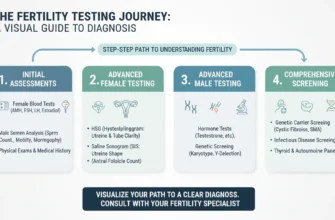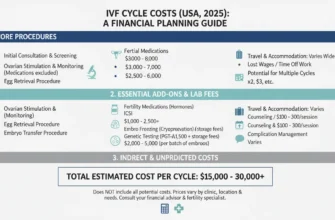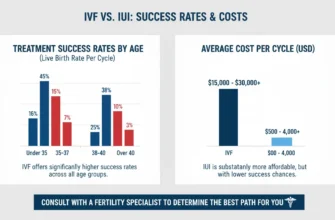Private Surrogacy Explained for Beginners
What is private surrogacy and how does it differ from agency-assisted surrogacy?
Private surrogacy involves an agreement made directly between intended parents and a surrogate, without the involvement of an agency. This differs from agency-assisted surrogacy, where a surrogacy agency facilitates the matching process and manages the legal and logistical aspects of the surrogacy journey.

Key Highlights
- Private surrogacy, also known as independent surrogacy, offers a more autonomous path for those seeking a surrogacy arrangement.
- It involves the intended parents and gestational carrier managing most aspects of the surrogacy process themselves, often without the assistance of a traditional surrogacy agency.
- While potentially reducing agency fees, private surrogacy requires meticulous planning, open communication, and a thorough understanding of the legal and medical complexities involved.
- Navigating the intricacies of surrogacy laws, medical procedures, and potential emotional challenges necessitates careful consideration and professional guidance.
- Establishing a clear surrogacy contract, outlining the rights and responsibilities of all parties, is paramount for a smooth and legally sound surrogacy journey.
Introduction
The surrogacy process offers hope to parents who want to grow their families. Normally, surrogacy agencies handle this process. However, a new way called private surrogacy is becoming more popular. This approach gives parents and surrogates more control. It allows them to work together more closely. This leads to a more personal and unique experience.
Understanding Private Surrogacy
Private surrogacy, also called independent surrogacy, changes the traditional surrogacy model. Instead of going through a surrogacy agency, it puts the intended parents in charge of the surrogacy journey and their chosen gestational carrier. This direct connection usually comes from an existing relationship, like family or close friends, making it easier to find a match.
This personal approach has special benefits, especially for those who want a more close and often cheaper surrogacy experience. Still, it is important to know that private surrogacy needs careful planning, strong communication, and a good understanding of the legal and medical issues involved in surrogacy.
The Basics of Private Surrogacy
Independent surrogacy is not just a simpler kind of agency-led surrogacy. It is a unique path that needs everyone to be hands-on. Without an agency, intended parents and the gestational carrier must take on more responsibility. This means they must be more involved and organized.
The most important part is the surrogacy contract. This legal document protects the rights, duties, and expectations of everyone involved. It covers money issues, medical guidelines, parental rights, and what to do in different situations. The contract makes sure the surrogacy journey is clear and agreed upon by all parties.
Understanding gestational surrogacy can be complicated. It needs a strong commitment to clear talks, set expectations, and respect between the intended parents and the surrogate. This teamwork, along with knowing the legal and medical side, helps create a good and rewarding surrogacy experience.
Pros and Cons of Choosing Private Surrogacy
Embarking on a private surrogacy journey offers some unique benefits that many people find appealing. First, it can lower the overall cost by cutting out agency fees. Many intended parents see this as a good way to save money while still working toward their goal of becoming parents.
Apart from saving money, private surrogacy can create a stronger emotional bond between the intended parents and the gestational carrier. Without an agency in the middle, they can talk directly to each other. This can help them make choices together and understand each other better.
Still, there are some drawbacks to consider. Private surrogacy requires a lot of time to handle legal, medical, and logistical tasks on your own. It might also be harder to find emotional support and advice, which means intended parents and the surrogate need to make extra efforts. Without an agency’s help, it takes more personal responsibility. You may also need outside help to make sure everything goes smoothly.
Preparing for Private Surrogacy
Preparing for a private surrogacy journey requires careful thought and planning. Both the intended parents and the gestational carrier need to be involved. One important part of preparation is to build a strong relationship. This relationship should have open communication, mutual respect, and clear expectations.
It is also very important to understand the legal and medical side of surrogacy. This means learning about the surrogacy laws in your state. You should also choose a good fertility clinic that has experience in third-party reproduction. It is a good idea to hire an experienced surrogacy attorney to create a legal surrogacy contract.
Essential Requirements and Initial Steps
Before starting the exciting surrogacy journey, it is important to handle a few key requirements. First, conducting background checks on both the intended parents and the gestational carrier is crucial. These checks build trust and make sure that everyone meets the legal and ethical guidelines for surrogacy.
Next, choosing a good fertility clinic that has a lot of experience with third-party reproduction is very important. The clinic will help with the medical parts of the surrogacy journey. This includes fertility treatments, embryo transfer, and prenatal care. It’s important to find a clinic that matches the values and wishes of both sides.
In addition, hiring a skilled surrogacy attorney who knows reproductive law is a must. They will help deal with the legal details of surrogacy. This includes creating and checking the surrogacy contract and making sure it follows state laws. A strong contract protects everyone’s rights and helps avoid legal troubles, making the surrogacy journey smoother and safe.
Finding the Right Surrogate: Tips and Best Practices
Finding the right surrogate mother is an important step in your surrogacy journey. Some intended parents choose someone they already know, while others look for a new match. This journey takes kindness, understanding, and care to make sure everyone has a good experience.
It is a good idea to work with an experienced surrogacy attorney when looking for a surrogate on your own. They can make your search easier, help you follow the law, and protect the interests of everyone involved. They can also help you with key points like:
- Defining Surrogate Requirements: Working together to set clear needs about medical history, lifestyle choices, and emotional readiness helps everyone stay on the same page and makes matching easier.
- Navigating Legal and Ethical Considerations: Knowing the surrogacy laws in your state and understanding consent and ethical issues is important for a legal and responsible surrogacy arrangement.
- Facilitating Open Communication: Building trust and having open conversations is key for a smooth surrogacy journey.
Keep in mind, finding the right match can take time and patience. Being thorough in your search, using trustworthy resources and experts, and building a respectful relationship with the potential surrogate are all essential.
A Beginner’s Guide to Private Surrogacy
Going through private surrogacy can feel challenging for those doing it for the first time. However, having a clear plan can turn it into a positive journey. The secret is to split the process into smaller, easier steps. This helps to follow the law, encourages open talk, and allows for smart choices at each stage.
Keep in mind that knowledge gives you power. Learning more, getting help from professionals, and creating a strong support network will help you have a successful and satisfying surrogacy experience.
Step 1: Understanding Legal Implications
Starting a private surrogacy journey requires knowing the complex surrogacy laws. These laws can change a lot from one state to another. Each state has its own rules about surrogacy contracts, parentage orders, and rights for intended parents and gestational carriers. It is very important to understand these legal details to make sure your surrogacy arrangement is safe and legal.
Talking to an experienced surrogacy attorney who knows about reproductive law is a key step. They can offer advice about the surrogacy laws in your state. They will help make sure your surrogacy contract meets all legal requirements. This will protect the rights and interests of both the intended parents and the surrogate during the journey.
The surrogacy contract is the main part of a solid surrogacy arrangement. It details the rights, duties, and expectations of everyone involved. The contract includes important issues like compensation, medical procedures, and parental rights. It creates a clear path for the entire surrogacy process.
Step 2: Setting Expectations with Your Surrogate
Establishing clear and realistic expectations is very important for a successful and happy surrogacy journey. It helps create respect and understanding between the intended parents and the surrogate mother. The surrogacy agreement is not just a legal document. It is also a way to ensure open communication and shared decisions. This helps build a trusting and respectful relationship.
Both parties should have honest talks about different parts of the surrogacy journey. This includes plans for contact, how often to communicate, involvement during medical visits, who makes decisions about the pregnancy, and birth wishes. Addressing these important matters early can help avoid misunderstandings or conflicts later on. This way, the experience can be smoother.
Additionally, talking about personal values, beliefs, and individual needs helps create a supportive environment. This allows the surrogate mother and intended parents to navigate the emotional challenges of the journey together with care. Regular check-ins, active listening, and real concern for one another’s well-being are vital to keeping a healthy and supportive relationship throughout the surrogacy experience.
Step 3: Medical Procedures and Health Screening
The medical part of private surrogacy is a complex process that needs careful planning. It is very important to focus on the health and well-being of the surrogate mother. The first step is a complete health check by qualified medical professionals. This ensures that the surrogate is fit both physically and mentally for a safe pregnancy.
The health check usually includes looking at medical history, genetic testing, blood tests, and a psychological review. This helps to find any risks or problems ahead of time. With this information, medical professionals can make smart choices about fertility treatments, embryo transfer, and prenatal care fitting the surrogate’s needs.
Also, it’s essential to have clear communication during the medical process. Both the parents wanting the baby and the surrogate mother need to be aware of the possible risks and benefits of treatments and procedures. This way, they can make informed decisions as a team. This teamwork helps everyone feel comfortable, respected, and empowered throughout the surrogacy journey.
Step 4: Financial Planning and Budgeting
While private surrogacy often proves less expensive than agency-managed surrogacy programs due to the absence of agency fees, it still requires meticulous financial planning and budgeting to ensure a smooth and financially secure experience for all parties. Transparent discussions and a clear understanding of financial obligations from the outset prevent future misunderstandings and ensure that the surrogate mother is fairly compensated for her invaluable contribution.
Developing a comprehensive budget encompassing various aspects of the surrogacy journey is essential. This includes:
|
Expense Category |
Details |
|
Legal Fees |
Attorney fees for contract drafting and legal services. |
|
Medical Costs |
Fertility treatments, prenatal care, delivery expenses. |
|
Surrogate Compensation |
Base compensation, monthly allowances, maternity clothes allowance. |
|
Travel & Accommodation |
Travel arrangements for medical appointments or embryo transfer. |
|
Psychological Support |
Counseling services for surrogate and intended parents. |
It is advisable to establish a secure payment system, such as an escrow account managed by a third party, to ensure timely and transparent financial transactions throughout the surrogacy program. meticulous financial planning provides peace of mind and helps both parties focus on the emotional and personal aspects of the surrogacy journey without financial stress.
Step 5: Emotional Support and Counseling
The emotional world of private surrogacy is very complex. It is filled with joy, hope, worry, and many other feelings for both the intended parents and the surrogate mother. Acknowledging these feelings is very important for a good experience. Having a strong support system of family, friends, or support groups helps create a safe space. Here, people can share their feelings, ask for help, and deal with the ups and downs of the surrogacy journey.
Getting help from a professional can also be very effective. This can be done through individual or group counseling. Trained therapists who work with surrogacy can offer strong emotional guidance. They provide a safe space to talk about worries, address concerns, and grow stronger to handle the unique challenges on this journey.
Encouraging open talk and listening with care between the intended parents and the surrogate mother builds emotional closeness and mutual understanding. Sharing feelings and respecting each other’s views creates a caring environment. This fosters trust and respect, and it helps them work together to celebrate achievements and face challenges with kindness.
Navigating the Surrogacy Journey
Starting the surrogacy journey, especially through private options, is like sailing in unknown waters. It is exciting, but also full of things to think about. Good planning and a clear understanding of the legal and medical side are important to get started. However, the journey asks for flexibility, patience, and teamwork between the surrogate mother and the intended parents.
Building a healthy and trusting bond is crucial. This bond should be based on open talks, understanding, and respect for each other. While this journey is all about bringing new life into the world, it needs strong emotional support. Both parties should communicate openly and be ready to face any surprises together.
Maintaining a Healthy Relationship with Your Surrogate
Maintaining a healthy relationship with the surrogate mother is very important for a good surrogacy experience for everyone. At the center of this relationship is open and honest communication. This helps connect the intended parents and the surrogate during the journey. Regular calls, video chats, or in-person visits, if possible, help everyone feel included and valued.
It is crucial to recognize and care for the surrogate mother’s emotional well-being. Pregnancy can be tough, both physically and emotionally, even in the best situations. Offering emotional support, celebrating key moments, and showing real empathy for the surrogate mother can strengthen the bond and promote respect between everyone.
It is also important to respect each other’s boundaries while being aware of everyone’s needs and preferences. Finding a balance between open communication and respecting personal space helps create a satisfying experience for everyone involved.
Handling Challenges During the Surrogacy Process
The surrogacy process can be a wonderful experience, but it often comes with emotional ups and downs for everyone involved. It’s a big change, and unexpected challenges, medical worries, or emotional struggles may occur. This requires strength, patience, and good communication to get through.
It’s crucial to keep things open and honest, especially during tough times. Talking truthfully about fears, worries, or any problems helps create a safe and caring space. Listening carefully and showing understanding can help close emotional gaps and strengthen the bond between the intended parents and the surrogate during difficult moments.
Getting help from a therapist who knows about third-party reproduction can also be very helpful. Counseling gives everyone a safe place to talk about their feelings, learn how to communicate well, and deal with complicated situations with care and understanding.
Conclusion
Private surrogacy is a special way to become a parent. However, it brings along some important things to think about. There are legal issues to consider and emotional support needed during this journey. You need to know the good and bad sides of surrogacy. Finding the right surrogate and keeping a good relationship is essential. Good communication, clear legal agreements, and taking care of emotional well-being can help everyone involved. If you are thinking about private surrogacy, doing careful research and getting help from professionals can make this big decision a positive and happy one.
Frequently Asked Questions
What Legal Protections Should Be Considered in Private Surrogacy?
Navigating private surrogacy means you must follow the surrogacy laws and legal requirements closely. This is why it is important to work with an experienced surrogacy attorney. A well-made surrogacy contract will explain all the legal parts of the agreement. It will also protect the rights and responsibilities of everyone involved when you choose the independent route.
How to Choose a Surrogate That’s Right for You?
Choosing the right surrogate mother takes careful thought. You should think about several important factors. Matching programs can help with this. However, as intended parents, you need to clearly define your surrogate requirements. This includes the qualities, values, and expectations you want. Doing this will help you make the right choice.









